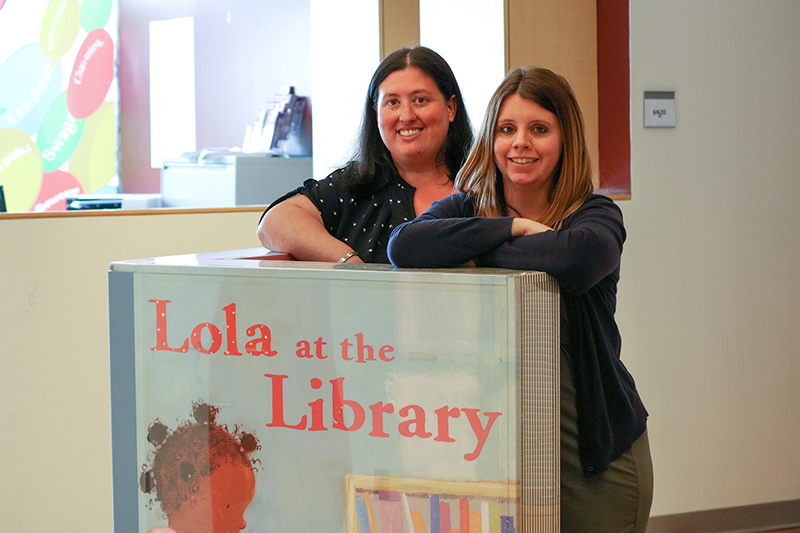Monday, June 17, 2019

A social worker and patient navigator discuss how they provide services, reduce stigma, and break down barriers to care.
Being a new parent is a tough job for anyone—but it’s even more difficult when substance use recovery is part of the mix. For parents who are also struggling with a lack of resources such as housing, transportation, or childcare, the situation can be overwhelming. Enter Boston Medical Center’s (BMC’s) SOFAR (Supporting Our Families through Addiction and Recovery) program, which provides care and assistance to families to encourage healthy outcomes for both parents and children.
SOFAR, which turns two in July 2019, sits within BMC’s pediatric primary care clinic and expands upon the prenatal care offered by BMC’s Project RESPECT. SOFAR’s team of seven—comprised of physicians, nurse practitioners, a social worker, and a patient navigator—currently serves 125 families that are affected by substance use. The integration of a social worker and patient navigator is an essential part of the program, helping patients make progress on their parenting and recovery goals, and preventing parent-child separation.
Jill Baker, SOFAR’s clinical social worker, provides behavioral health support and crisis management services. “A lot of my work is helping parents with whatever they need help with, because if the parent’s not doing well, the child’s not going to do well, and they will end up separated,” she said.
“Especially when the kids are younger, it’s a lot of parental mental health, making sure that they’re connected to therapists, recovery support—and if they’re not going to connect, I’m the one doing the relapse prevention, recovery work, providing emotional support, and all the stuff that comes along with being a new parent,” said Baker. “I’ll give referrals to specialized daycares, programs that work specifically with parents in recovery, and work with DCF (Department of Children & Families).”
Kristin Reed, SOFAR’s patient navigator, focuses on eliminating barriers that can stand in the way of families accessing the care they need. She is often a parent’s first point of contact, and is a resource for a variety of issues, from baby formula to public benefits: she schedules appointments to help families consolidate their trips to BMC, coordinates access to WIC, Early Intervention, and MassHealth’s PT-1 transportation service, and connects patients to housing services through Metro Housing Boston. She also reminds patients of their appointments and follows up if they miss appointments to ensure they stay connected to care.
“We have moms come to us and say ‘this is the first time I haven’t felt judged.'”
“Having a direct line makes everything better for the families—knowing us personally, and us knowing the families so well,” said Baker. “From a patient perspective, the relationships they’ve been able to develop with all of us, including their primary care doctors, is great. Knowing that a mom trusts me to have a conversation when she’s not doing well—and not feeling scared—is amazing.”
Stigma is often a barrier to care, said Baker, which shows up in families either using emergency department services, or not coming in for medical appointments out of fear of DCF removing their children. Positive relationships are key to the recovery process. “We have moms come to us and say ‘this is the first time I haven’t felt judged,’” said Reed.
While SOFAR is still reviewing their preliminary data on patient outcomes, Reed said that many families have stayed intact. “We’ve gotten over one of the big humps – the 6-9-month age is when relapse is most likely to happen,” she said.
Open and frequent communication between team members is key to SOFAR’s success. The team meets weekly to make sure patients don’t slip through the cracks, said Reed. And although in many medical settings, doctors have ultimate authority, SOFAR’s operations are more egalitarian. “It doesn’t feel like a top-heavy approach in this clinic – they really value our opinions and constructive criticism and feedback,” said Baker. “Our providers are very appreciative. They know how much easier their job is because we’re here,” added Reed.
The program does face its challenges, however, often due to systemic problems outside of BMC. “So many expectations are put on [parents in recovery],” said Baker. “If they’re in a residential program, they need to be doing chores. They need to go back to work after six weeks of maternity leave. Getting kids into daycare is so difficult for these parents—they need to be working to get a daycare voucher, but they can’t work if they don’t have daycare. It’s an impossible system.”
Additionally, Medicaid and Medicare do not currently pay for all of the services social workers and patient navigators provide. “We’re not able to bill for our services, but we are being extremely helpful,” said Reed. “We are saving money in the long run. If a mom is feeling sad and stressed out, spending time to help her overcome challenges – that’s going to have a better outcome for her kids. Building these relationships takes time. But it’s hard to show that on paper, because it’s not an immediate box we can check that says ‘this has been completed.’ It can take a year for something to come to fruition.”
Workforce capacity is also an issue. “Ideally we need more of us,” said Reed. “There’s so much more that we could do.”
This article is part of a Center for Innovation in Social Work & Health (CISWH) series that highlights success stories about social workers working in healthcare and public health to address the non-medical factors that impact health, known as social determinants of health. Know of a healthcare team that’s doing innovative work involving social workers? Contact us—we want to hear your story.
Article and photo by Nilagia McCoy, Center for Innovation in Social Work & Health.